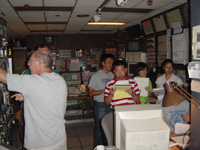 |
|||||||||||
|
|||||||||||
|
|||||||||||
In May 2006, the GDE, ICFA Beam Dynamics Panel and the International Linear Collider Steering Committee will sponsor the International School for Linear Colliders. As the first accelerator school that will be focused on linear colliders, the goal of the school is to recruit new young scientists to join the global ILC effort. While another article in today's issue of NewsLine reports on more details about this upcoming school, it seems appropriate to take a deeper look into the role of accelerator schools in the field of particle physics. For more than 25 years now, accelerator schools around the world have played an increasingly larger role in educating and recruiting accelerator physicists. DESY's Nick Walker, who has attended CERN's Accelerator School and taught in the U.S. Particle Accelerator School, explained that these schools are the basic place where physicists and engineers learn how to build and operate accelerators. "My generation and the generation before mine learned about accelerators on the job", he said. "But now these machines have become so complicated and specialized that on the job training isn't sufficient. The accelerator schools play an enormous role." Maury Tigner of Cornell University agrees that accelerator schools play a very important role for educating scientists in the field. "There are at least three reasons why these schools are important", he says. "These schools provide the only opportunity for in service training of technical personnel in the various practical and theoretical aspects of accelerators. Accelerator schools also bring together the world wide experts in the various fields that are important to the accelerator design, construction and operation. And at many of the schools, hands on experience in the technologies that are important for accelerator work are made available to the students under the guidance of world renowned experts." Tigner, who was involved with the USPAS that was held at Cornell University this past summer, emphasized that the hands on experience at these schools provides unique opportunities for the students. "For two weeks this past summer, students had access to the Cornell accelerator for much of the day shifts to carry out assigned measurements on the accelerators with live beam", he says. "This was very popular and the students were very good and learned a lot that will be of use to them in their work." The growing need for these schools stems from lack of accelerator physics courses in the universities. In Europe however, particularly in the United Kingdom, universities are starting to incorporate accelerator physics courses into their classrooms. "This is very new", Walker said. "The UK universities recognized that in house accelerator expertise has gone to zero. This won't replace the accelerator schools by any means, but it is a very unique and important initiative." Mel Month, who founded the USPAS, provided some insight into the history of accelerator schools and their role in educating future generations. "When accelerators first started after World War II, the scientists and engineers who built the machines and did the accelerator physics came from other areas of physics", he said. "They got on the job training and became experts. After World War II, the national laboratories were established. As time went on, it became more difficult to train people and the accelerator technology got more complicated. All of the accelerator experts gravitated toward working at the labs rather than at the universities." Not having accelerator experts at the universities meant that no one was available to educate students about accelerator science. Recognizing the education of young scientists is the lifeline for the future of particle physics, Month organized the first school with the help of Leon Lederman and Pief Panofsky at Fermilab in 1981. Since that time, the USPAS has sponsored approximately two schools every year. On average, 150 students enroll in each school and earn course credit. "The need for accelerator expertise is still there", Month said. "There is a deep connection between education and keeping the very nature of laboratories alive." Tigner agrees that accelerator schools are essential for recruiting new scientists and engineers, keeping the field of particle physics alive. "The field benefits both by improved performance of accelerator workers and by the recruitment of new scientists and engineers, keeping the fields of accelerator based science alive", he said. --Elizabeth Clements |
|||||||||||
| © International Linear Collider |
